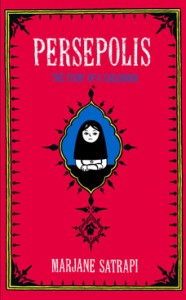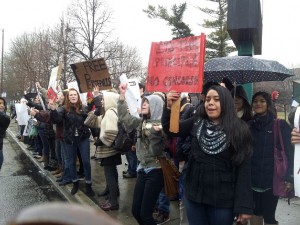 When a blogger leaked a March 14 email from the principal of Lane Tech College Prep in Chicago, Illinois, students in the district took immediate action. Within hours of discovering the email, students used social media to organize a protest that put hundreds of them on the rainy streets outside Lane Tech and in front of one of the most telling case studies on the state of book censorship today.
When a blogger leaked a March 14 email from the principal of Lane Tech College Prep in Chicago, Illinois, students in the district took immediate action. Within hours of discovering the email, students used social media to organize a protest that put hundreds of them on the rainy streets outside Lane Tech and in front of one of the most telling case studies on the state of book censorship today.
What could drive students in the district to take such action? The email directed teachers to remove Marjane Satrapi’s Persepolis from classrooms and libraries under order of Chicago Public Schools officials. Satrapi’s graphic memoir of growing up during the Iranian Revolution has received international acclaim since its initial publication in French. When it was released in English in 2003, both Time Magazine and the New York Times recognized it as one of the best books of the year. In 2007 it was adapted as an animated film, which was nominated for an Oscar and won the Cannes Film Festival Jury Prize and a French César. Although it was certainly controversial in the Middle East, there were no publicly reported challenges or bans of the book in U.S. schools or libraries until March 2013, when Chicago Public Schools administrators abruptly pulled it from some classrooms.
• Marjane Satrapi Wants to Know What CPS Fears About Persepolis

Students, teachers, and parents protest the Persepolis ban outside Lane Tech College Prep (source: Banned Books Week)
The circumstances surrounding the ban remain unclear to this day. In an email to employees, principal Christopher Dignam of Lane Tech College Prep High School initially said that he had been instructed by district administrators to remove Persepolis from the school’s library in addition to discontinuing its use in classrooms. Predictably, a furor ensued as students and teachers held protests and anti-censorship groups including CBLDF demanded an explanation. The day after Dignam’s email, district CEO Barbara Byrd-Bennett sent another email to principals claiming that the intention was never to remove the book from libraries, but only from classrooms due to “graphic language and images that are not appropriate for general use.” She said the book would no longer be used at all in 7th grade classrooms, and would remain suspended in grades 8-10 while district curriculum planners considered whether it might be used there after “appropriate teacher training.”
As Chicago students themselves pointed out, the few panels in Persepolis depicting torture techniques that were used on Iranian dissidents are no more graphic than images encountered while studying other true events such as the Holocaust or slavery. Moreover, many of these same students are exposed to real-life violence daily in their own neighborhoods, so the official CPS justification for the restriction of a modern classic in the nation’s third-largest school district remains unconvincing.
• Students, Teachers, Iranian-born Artist React to PERSEPOLIS Ban
Book censorship, and its impact on comics, is possibly one of the most underdiscussed but important stories happening in America today. The pace and frequency of book censorship is growing. No other incident is as emblematic of this attack on a modern graphic novel. CBLDF-sponsored Kids’ Right to Read Project sent two letters in defense of Persepolis, but the response from CPS remained far from satisfactory, from arbitrary and seemingly erratic reasons for the ban to calls for unneeded additional training to prepare teachers for using the book in classrooms.
• Book Challenges on the Rise in 2013
Even with the victory over the Persepolis ban, the ground beneath prose books and graphic novels feels shaky. Since Persepolis, CBLDF has helped defend against a barrage of challenges, including multiple attacks against Stephen Chbosky’s The Perks of Being a Wallflower and Sherman Alexie’s The Absolutely True Story of a Part-Time Indian, a complete (and thankfully temporary) ban on Ralph Ellison’s seminal Invisible Man, and the temporary restriction on Neil Gaiman’s Neverwhere.
• Victory in NM: Neil Gaiman’s Neverwhere Returned to Classrooms
• Illinois School District Lifts Ban on The Perks of Being a Wallflower
• CBLDF Defends The Absolutely True Diary of a Part-Time Indian in Montana Victory
• Ban on Ralph Ellison’s Invisble Man Rescinded in North Carolina
In the months since the Persepolis ban was mostly reversed, the Chicago students who organized protests against it have received some well-deserved recognition from intellectual freedom organizations. In September three Lane Tech student members of the 451 Degrees Banned Book Club were named Banned Books Week Heroes, and a few weeks later the Illinois Library Association awarded its annual Intellectual Freedom Award to the entire student body with special recognition for 451 Degrees. Although CPS administrators’ willingness to remove a book from classrooms without even a formal review is worrying, the students who spoke up certainly give us hope for the future.
• Student Defenders of Persepolis Recognized by Illinois Library Association
We need your help to keep fighting for the right to read in 2014! Help support CBLDF’s important First Amendment work by visiting the Rewards Zone, making a donation, or becoming a member of CBLDF!
Maren Williams is a reference librarian who enjoys free speech and rescue dogs.